|
|
|
Sort Order |
|
|
|
Items / Page
|
|
|
|
|
|
|
| Srl | Item |
| 1 |
ID:
150437
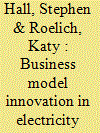

|
|
|
|
|
| Summary/Abstract |
This research investigates the new opportunities that business model innovations are creating in electricity supply markets at the sub-national scale. These local supply business models can offer significant benefits to the electricity system, but also generate economic, social, and environmental values that are not well accounted for in current policy or regulation. This paper uses the UK electricity supply market to investigate new business models which rely on more complex value propositions than the incumbent utility model. Nine archetypal local supply business models are identified and their value propositions, value capture methods, and barriers to market entry are analysed. This analysis defines 'complex value' as a key concept in understanding business model innovation in the energy sector. The process of complex value identification poses a challenge to energy researchers, commercial firms and policymakers in liberalised markets; to investigate the opportunities for system efficiency and diverse outcomes that new supplier business models can offer to the electricity system.
|
|
|
|
|
|
|
|
|
|
|
|
|
|
|
|
| 2 |
ID:
150703


|
|
|
|
|
| Summary/Abstract |
Diverse solar PV business models and financing options exist in the international landscape, helping expand and accelerate the adoption of rooftop solar PV systems. The conditions for their emergence are context specific, depending on the policies, regulations, incentives, and market conditions of each country. After a review of the international landscape, this paper compiles and analyzes business models and financing options for rooftop solar PV investment in Thailand that have emerged during the period between 2013 and 2015. Despite policy discontinuity for the support of rooftop solar systems, diverse business models and financing options are driving market expansion and expanding solar access to more Thai consumers. Drawing on our policy and regulatory analyses and in-depth interviews with business representatives, we identify four types of business models and one financing option. The business models include Roof Rental, Solar PPA, Solar Leasing, and Community Solar, and the financing option is the solar loan. We analyze the drivers for their emergence, barriers to their success, and the risks from the business owners' and consumers' viewpoints. Our policy recommendation is focused on crafting a net-metering regulation with evidence-based studies on the potential costs and benefits to different stakeholders.
|
|
|
|
|
|
|
|
|
|
|
|
|
|
|
|
| 3 |
ID:
096711


|
|
|
|
|
| Publication |
2010.
|
| Summary/Abstract |
This paper presents the business models of small-scale heat energy production in Finland. Firstly, the development of heat entrepreneurship in the country is presented, including the remarkable growth of small and medium size enterprises (SMEs) in the last 15 years. Secondly, the concept of business model (business architecture of product/service flows and earning logics) is modified to the framework of wood heat production. The business model concept, and its sub-concepts, is applied in a brief review of current heat energy businesses in Finland. We arrive at a business model of heat entrepreneurships that are public companies/utilities, public-private partnerships, private companies and cooperatives, Energy Saving Company (ESCO), network model of large enterprise and franchising. Descriptive cases of these models are presented. Finally, the paper concludes with a discussion on the applicability of the business models in different operational environments and geographical contexts.
|
|
|
|
|
|
|
|
|
|
|
|
|
|
|
|
| 4 |
ID:
115148
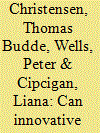

|
|
|
|
|
| Publication |
2012.
|
| Summary/Abstract |
This paper explores the geographical and policy context for an emergent business model from Better Place to deliver battery electric car mobility in Denmark. It argues that the combination of radically different technologies and a highly complex multi-agency operating environment theoretically provide the conditions and requirements for such an emergent business model. While focused on battery electric cars, renewable energy generation and smart grids, the paper has wider applicability to an understanding of the interplay between place, innovation and sustainability which suggests that diverse solutions are likely to be the characteristic solution rather than ubiquity and standardization. The paper argues, however, that the innovative business model, the deployment of electric vehicles, and the use of renewable energy systems, in this case largely based on wind power, while mutually supportive and contributing to wider policy aims with respect to the reduction of carbon emissions, may still fail in the face of entrenched practices. At the theoretical level it is concluded that theorization of business models needs a broader perspective beyond the typical 'value creation, value capture' rubric to better understand the wider role such models have in meeting societal goals, and to understand the structural impediments to organizational and technical innovation.
|
|
|
|
|
|
|
|
|
|
|
|
|
|
|
|
| 5 |
ID:
177138
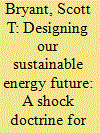

|
|
|
|
|
| Summary/Abstract |
A lack of understanding amongst industry and government regarding future business model and policy routes for achieving renewable energy targets risks society falling short of the energy transition required to help limit global heating to 1.5 °C. Despite a lack of clarity regarding the business- and governance-models required to facilitate such a transition, the urgency for achieving this shift is becoming increasingly apparent amongst industry and government. This paper explores the business and governance-models seen as likely to facilitate the adoption and uptake of sufficient levels of VRE to meet the global energy sector's climate crisis mitigation responsibilities. A Grounded Theory approach was undertaken to investigate and analyse the results of 28 semi-structured interviews, the coding of which involved the identification of 4 themes and 12 sub-themes. These themes allowed the development of an overarching sectoral pathway solution, framed in the form of a ‘government keystone model’, that exemplifies the current sectoral reality that governments hold the power to clearly design and implement an economically, environmentally and societally beneficial shift to high levels of VRE. It is argued this proactive role could be adopted using the looming “shock” to the margins of traditional energy business models by rising levels of VRE.
|
|
|
|
|
|
|
|
|
|
|
|
|
|
|
|
| 6 |
ID:
127206
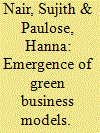

|
|
|
|
|
| Publication |
2014.
|
| Summary/Abstract |
Emergent business models seek to take advantage of new market mechanisms driven by technological changes, particularly those related to the production and delivery of clean or sustainable energy. Such business models often function at the intersection of various industries, with global views, and the resulting systems have distinct social, political, environmental, economic, technological, and business dimensions. Such holistic systems are not only difficult to develop but also require support from a broad range of actors with effective regulations and policies in place, such that the firm functions within a framework that integrates various factors. This study substantiates such a framework by detailing the nascent algae-based bio-fuel industry that caters to the aviation sector while arguing that businesses in the energy industry can emerge as a next-practice platform that drive a sixth wave of innovation. The framework begins with three basic enablers, innovation, flexibility, and sustainability, and explains how value from renewable energy technologies can be created and captured sustainably and innovatively with new market mechanisms implemented by firms with green business models.
|
|
|
|
|
|
|
|
|
|
|
|
|
|
|
|
| 7 |
ID:
111057
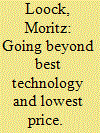

|
|
|
|
|
| Publication |
2012.
|
| Summary/Abstract |
Renewable energy is becoming increasingly important for economies in many countries. But still in an emerging industry, renewable energy requires supportive energy policy helping firms to develop and protect competitive advantages in global competition. As a guideline for designing such policy, we consult well-informed stakeholders within the renewable energy industry: investors. Their preferences serve as explorative indicator for assessing which business models might succeed in competition. To contribute to only limited research on renewable energy investors' preferences, we ask, which business models investment managers for renewable energy prefer to invest in. We report from an explorative study of 380 choices of renewable energy investment managers. Based on the stated preferences, we modelled three generic business models to calculate the share of investors' preferences. We find exiting evidence: a "customer intimacy" business model that proposes best services is much more preferred by investors than business models that propose lowest price or best technology. Policy-makers can use those insights for designing policy that supports service-driven business models for renewable energy with a scope on customer needs rather than technology or price. Additionally, we state important implications for renewable energy entrepreneurs, managers and research.
|
|
|
|
|
|
|
|
|
|
|
|
|
|
|
|
| 8 |
ID:
110695


|
|
|
|
|
| Publication |
2011.
|
| Summary/Abstract |
Burning of biomass for cooking is associated with health problems and climate change impacts. Many previous efforts to disseminate improved stoves - primarily by governments and NGOs - have not been successful. Based on interviews with 12 organizations selling improved biomass stoves, we assess the results to date and future prospects of commercial stove operations in India. Specifically, we consider how the ability of these businesses to achieve scale and become self-sustaining has been influenced by six elements of their respective business models: design, customers targeted, financing, marketing, channel strategy, and organizational characteristics. The two companies with the most stoves in the field shared in common generous enterprise financing, a sophisticated approach to developing a sales channel, and many person-years of management experience in marketing and operations. And yet the financial sustainability of improved stove sales to households remains far from assured. The only company in our sample with demonstrated profitability is a family-owned business selling to commercial rather than household customers. The stove sales leader is itself now turning to the commercial segment to maintain flagging cash flow, casting doubt on the likelihood of large positive impacts on health from sales to households in the near term.
|
|
|
|
|
|
|
|
|
|
|
|
|
|
|
|
| 9 |
ID:
150790


|
|
|
|
|
| Summary/Abstract |
The analysis of economic implications of innovative business models in networked environments, as electro-mobility is, requires a global approach to ensure that all the involved actors obtain a benefit. Although electric vehicles (EVs) provide benefits for the society as a whole, there are a number of hurdles for their widespread adoption, mainly the high investment cost for the EV and for the infrastructure. Therefore, a sound business model must be built up for charging service operators, which allows them to recover their costs while, at the same time, offer EV users a charging price which makes electro-mobility comparable to internal combustion engine vehicles. For that purpose, three scenarios are defined, which present different EV charging alternatives, in terms of charging power and charging station ownership and accessibility. A case study is presented for each scenario and the required charging station usage to have a profitable business model is calculated. We demonstrate that private home charging is likely to be the preferred option for EV users who can charge at home, as it offers a lower total cost of ownership under certain conditions, even today. On the contrary, finding a profitable business case for fast charging requires more intensive infrastructure usage.
|
|
|
|
|
|
|
|
|
|
|
|
|
|
|
|
| 10 |
ID:
093499
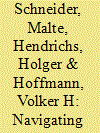

|
|
|
|
|
| Publication |
2010.
|
| Summary/Abstract |
From a slow start, the clean development mechanism (CDM) market has recently experienced enormous growth. However, the CDM market has been increasingly criticised, resulting in a lively debate about how to reform, complement, or replace it. In order to increase transparency and assist policy-makers in better understanding the current market, we depart from the traditional project-level perspective on CDM and analyse commercial activities by utilising data from UNEP Risoe's CDM Bazaar. To this end, we first establish a seven-step value chain by conducting a factor analysis on the commercial activities indicated in the Bazaar and, second, identify nine prevalent business models with a cluster analysis of all 495 participating organisations. Based on these analyses, we discuss potential impacts on the value chain of different policy scenarios that rely on carbon credits as incentive. We find that the importance of specific regulatory CDM know-how and general business activities such as finance varies strongly with the different policy scenarios. Our analysis serves to sensitise policy-makers and business about implications of different regulatory designs.
|
|
|
|
|
|
|
|
|
|
|
|
|
|
|
|
| 11 |
ID:
105757
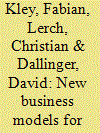

|
|
|
|
|
| Publication |
2011.
|
| Summary/Abstract |
Climate change and global resource shortages have led to rethinking traditional individual mobility services based on combustion engines. As the consequence of technological improvements, the first electric vehicles are now being introduced and greater market penetration can be expected. But any wider implementation of battery-powered electrical propulsion systems in the future will give rise to new challenges for both the traditional automotive industry and other new players, e.g. battery manufacturers, the power supply industry and other service providers. Different application cases of electric vehicles are currently being discussed which means that numerous business models could emerge, leading to new shares in value creation and involving new players. Consequently, individual stakeholders are uncertain about which business models are really effective with regard to targeting a profitable overall concept. Therefore, this paper aims to define a holistic approach to developing business models for electric mobility, which analyzes the system as a whole on the one hand and provides decision support for affected enterprises on the other. To do so, the basic elements of electric mobility are considered and topical approaches to business models for various stakeholders are discussed. The paper concludes by presenting a systemic instrument for business models based on morphological methods.
|
|
|
|
|
|
|
|
|
|
|
|
|
|
|
|
| 12 |
ID:
113494


|
|
|
|
|
| Publication |
2012.
|
| Summary/Abstract |
Twenty years since the Rio Summit, the global community is still struggling to develop a world with universal access to sustainable energy services. The discussion on energy and its linkages with sustainable development is at the heart of the debate in achieving the Millennium Development Goals (MDGs). This paper discusses the role of innovations in terms of partnerships and business models to enhance energy access, especially for those living at the so-called bottom of pyramid. The role of innovative energy options and policy choices that enable overall operationalization of energy access in developing countries as well as new forms of partnerships and innovative mechanisms that are based on established success, replicability and potential for scaling up has been examined through two case-studies, namely the Lighting a Billion Lives project and India's National Rural Electrification Programme. This paper suggests the need for new forms of public and private sector partnerships, especially the pro-poor ones that are effective in enhancing energy access.
|
|
|
|
|
|
|
|
|
|
|
|
|
|
|
|
| 13 |
ID:
192775


|
|
|
|
|
| Summary/Abstract |
While heat pumps are a promising solution for decarbonizing residential buildings, financial barriers often hinder their diffusion. Asset leasing – whereby service providers lease equipment and provide services in exchange for monthly payments – could help overcome some of the barriers to adoption. This study investigates homeowners' preferences for heat-pump leasing, examines their inclination to lease or purchase, and quantifies their willingness to pay for different services. Empirical insights are drawn from a discrete choice experiment conducted with 915 single-family house owners who undertook 9150 hypothetical leasing decisions in France, Germany, and Switzerland. Survey results show an interest in flexible, all-inclusive leasing offerings, especially in markets where heat pumps are at an early stage of diffusion. However, preferences for asset leasing differ between countries. German house owners are the most open to leasing and would on average be willing to pay up to three times more than their French counterparts to shield themselves against technical risk. Given the role asset leasing could play in decarbonizing residential heat and enhancing energy security, policy makers may wish to adapt policy incentives to account for these service-based offerings.
|
|
|
|
|
|
|
|
|
|
|
|
|
|
|
|
| 14 |
ID:
169871
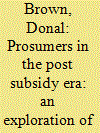

|
|
|
|
|
| Summary/Abstract |
This paper explores the evolving renewable energy ‘prosumer’ phenomenon in the United Kingdom (UK). It identifies and evaluates how prosumer business models can exist beyond direct subsidy and the range of prosumer business model archetypes currently in operation. Through a series of in-depth interviews and document analysis, the paper identifies the key opportunities and challenges for these innovative energy business models. The analysis shows that recent developments in technology such as the diffusion of smart meters, li-ion batteries, peer-to-peer trading platforms and electric vehicles are opening up a range of new value propositions, which in turn are beginning to be exploited by a range of new business models. In many cases the regulatory, financing and institutional governance landscape of the UK lags behind, however, inhibiting these emerging business models. Moreover, these business models rely on managing a complex set of values for consumers that reach deeper into their lives than traditional tariffs. Thus, successful business models must manage this complexity if they are to be adopted by the disengaged majority. Energy policy and energy practitioners can leverage these emerging trends in service of a low carbon energy transition by adopting ‘ten principles’ of prosumerism; and six UK policy recommendations.
|
|
|
|
|
|
|
|
|
|
|
|
|
|
|
|
| 15 |
ID:
109676


|
|
|
|
|
| Publication |
2011.
|
| Summary/Abstract |
Electric vehicles (EVs) present efficiency and environmental advantages over conventional transportation. It is expected that in the next decade this technology will progressively penetrate the market. The integration of plug-in electric vehicles in electric power systems poses new challenges in terms of regulation and business models. This paper proposes a conceptual regulatory framework for charging EVs. Two new electricity market agents, the EV charging manager and the EV aggregator, in charge of developing charging infrastructure and providing charging services are introduced. According to that, several charging modes such as EV home charging, public charging on streets, and dedicated charging stations are formulated. Involved market agents and their commercial relationships are analysed in detail. The paper elaborates the opportunities to formulate more sophisticated business models for vehicle-to-grid applications under which the storage capability of EV batteries is used for providing peak power or frequency regulation to support the power system operation. Finally penetration phase dependent policy and regulatory recommendations are given concerning time-of-use pricing, smart meter deployment, stable and simple regulation for reselling energy on private property, roll-out of public charging infrastructure as well as reviewing of grid codes and operational system procedures for interactions between network operators and vehicle aggregators.
|
|
|
|
|
|
|
|
|
|
|
|
|
|
|
|
| 16 |
ID:
181807


|
|
|
|
|
| Summary/Abstract |
Hawaii's 100% Renewable Portfolio Standard target has led to rapid growth in renewable generation resources. This has resulted in grid issues given the islanded nature of Hawaii's grid. The state has decided to use battery storage in its grid to address these issues. This motivates us to try to understand the various business models in the state and the minimum set of barriers that must be overcome for its successful deployment. We achieve the former by assessing the projects in the state and identifying the dominant business models. For the latter, we use a barrier-solution framework that posits the minimum set of barriers that must be met for the successful deployment of battery storage business models and we verify it by identifying the role of various policies/drivers in supporting these business models. As a result, we find predominantly three business models in Hawaii: Co-located Front-of-the-Meter, Behind-the-Meter, and Aggregated Behind-the-meter. We also verify that at least one barrier from barrier categories associated with market demand and project economics along with all the barriers related to interconnection and market participation must be addressed for successful deployment of battery storage. Based on these findings, we give recommendations to policymakers seeking to develop a battery storage market.
|
|
|
|
|
|
|
|
|
|
|
|
|
|
|
|
| 17 |
ID:
191353
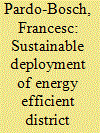

|
|
|
|
|
| Summary/Abstract |
Heating and cooling account for 50% of the European Union's energy consumption and, therefore, reducing its impact is essential to minimise dependency on energy imports (particularly fossil fuel), which are bound to geopolitical conflicts. District heating arises as a critical player in this transition towards a more efficient energy framework. Despite its numerous advantages, implementation is still hindered by inadequate District Heating business models and incentives. This study conducts a holistic examination on the feasibility, effectiveness and, ultimately, the efficiency of establishing a publicly owned and public-privately managed District Heating infrastructure network via a pilot intervention in the city of San Sebastian in the north of Spain. A Value Proposition Canvas, Value Creation Ecosystem and City Model Canvas analysis provides insight into fundamental patterns and relevant recommendations for other municipalities trying to find a business model in which all the involved stakeholders can capture value while addressing at the same time the energy challenges of cities.
|
|
|
|
|
|
|
|
|
|
|
|
|
|
|
|
| 18 |
ID:
125502


|
|
|
|
|
| Publication |
2013.
|
| Summary/Abstract |
While pilot projects in the smart grid domain have abounded through public and private efforts, there is still uncertainty in identifying effective business models for the smart grid. In this paper we take the view of a new entrant in this market acting as a third party provider of demand response. New entrants are a key player in emerging technological domains but simulation and policy analysis from this perspective have not been forthcoming. We present a novel approach for evaluating business models within a regulatory context and avoid committing to specific technical solutions but instead embark on a parameter exploration through simple yet insightful agent-based models. Our simulations analyse the impact of system performance by three key variables; participant population size, household flexibility in terms of the maximum number of DR events allowed and size of load shifting/shedding available. The simulations indicate that benefits of avoided capital investment leads to valuing a participating household at approximately £1800 over a 20 year period. These results show how mandated infrastructure influenced by policy can affect the value proposition of a demand response service and provide a useful reference for system level parameter requirements. With weak business models, policy decisions can be crucial in providing the impetus needed to spur growth in this market.
|
|
|
|
|
|
|
|
|
|
|
|
|
|
|
|
| 19 |
ID:
150440


|
|
|
|
|
| Summary/Abstract |
Energy policies in many countries push for an increase in the generation of wind and solar power. Along these developments, the balance between supply and demand becomes more challenging as the generation of wind and solar power is volatile, and flexibility of supply and demand becomes valuable. As a consequence, companies in the electric power sector develop new business models that create flexibility through activities of timing supply and demand. Based on an extensive qualitative analysis of interviews and industry research in the energy industry, the paper at hand explores the role of timing-based business models in the power sector and sheds light on the mechanisms of flexibility creation through timing. In particular we distill four ideal-type business models of flexibility creation with timing and reveal how they can be classified along two dimensions, namely costs of multiplicity and intervention costs. We put forward that these business models offer ‘coupled services’, combining resource-centered and service-centered perspectives. This complementary character has important implications for energy policy.
|
|
|
|
|
|
|
|
|
|
|
|
|
|
|
|
| 20 |
ID:
150664


|
|
|
|
|
| Summary/Abstract |
With almost $1 billion in funding, Better Place was poised to become one of the most innovative companies in the electric mobility market. The system Better Place proposed had two novel prongs; first, to reduce the cost of batteries, and second, to reduce range anxiety, public infrastructure concerns, and long charging times. Yet, despite this seemingly strong combination, Better Place failed to make any progress in Denmark and Israel, the first two markets it operated in, and subsequently declared bankruptcy, selling off its collective assets for less than $500,000. Drawing from science and technology studies and the notion of “interpretive flexibility,” this paper posits several reasons to explain the failure of Better Place, including that Denmark is not as “green” as it seems nor is the Israeli market as attractive as believed, and that Better Place's solution to charging time and range anxiety resolved a psychological, not a functional, barrier of the general public to adopt electric vehicles. Before investigating these two reasons, the paper presents a short history of Better Place and explores the contours of its operations in Denmark and Israel. It then discusses why Better Place “failed” across both countries before concluding with implications for energy planning, policy, and analysis.
|
|
|
|
|
|
|
|
|
|
|
|
|
|
|
|
|
|
|
|
|